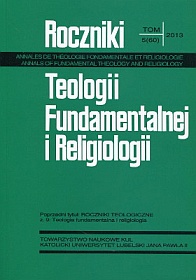Pluralistyczno-relatywistyczny model chrystologii Paula Knittera
Abstrakt
Pluralistic theology of religion is getting more and more popular in Poland. This kind of theology deals with such questions as: Are all religions equal? Does Christianity surpass all these religions? Is there any way to state clearly how one should relate to Jesus Christ today' word that strikes a balance between these two extremes?
No set of questions concerns Christian theologians more today. No questions have more practical relevance in the religiously most pluralistic country in the world. No American theologian has kept these questions on the theological agenda over the past three decades with more consistency than Paul Knitter. And none is more expert in his or her knowledge of the field. He is the chief disseminator of these views.
Paul F. Knitter is Paul Tillich Professor of Theology, World Religions and Culture at Union Theological Seminary in the City of New York He was formerly Emeritus Professor of Theology at Xavier University in Cincinnati, Ohio. He is a leading theologian of religious pluralism. He holds a licentiate in theology from the Pontifical Gregorian University in Rome (1966) and a doctorate from the University of Marburg, Germany (1972). Knitter's journey into interreligious dialogue began in 1964 when he was a seminarian in Rome and experienced the Second Vatican Council firsthand, at a time when the Roman Catholic Church declared its new attitude towards other religions. Since publishing his acclaimed book, No Other Name? (1985), Knitter has been widely known for his religious pluralism. Along with his friend and colleague, the Protestant philosopher of religion John Hick, Knitter has come under harsh criticism from Cardinal Ratzinger (presently the Pope of the Roman Catholic Church).
Knitter is against using absolutist language to depict the Saviour in interreligious dialogue, and writes about the relational understanding of the uniqueness of Jesus: the Saviour is to be understood in relation to other saviours. Although Jesus is truly the Word of God, Knitter states that he is not the only word: he is God's universal, decisive and indispensable manifestation of saving truth and grace. According to Knitter, the creed and other Christian dogmas concerning Jesus are to be interpreted symbolically as expressions of the church's experience of Christ. Here Knitter's insight is contrary to the traditional church's teaching on Jesus as far as it has an ontological foundation. Knitter's teaching about the relational uniqueness of Jesus is naturally unacceptable to bishops, because it alters the way the faith is proclaimed and it also deviates from what is central to Christianity.
Bibliografia
Gillis Ch.: Pluralism: A New Paradigm for Theology. Leuven: Peeters Press − W. B. Eerdmans 1993.
Knitter P.: Can Our „One and Only” also Be a „One among Many”? W: The Uniqueness of Jesus. A Dialogue with Paul Knitter. Red. L. Swidler, P. Mojzes. New York: Orbis Books 1997 s. 145-182.
Knitter P.: Ein Gott – viele Religionen. Gegen den Absolutheitsanspruch des Christentums. München: Kösel 1988.
Knitter P.: Jesus and the Other Names. Christian Mission and Global Responsibility. New York: Orbis Books 1996.
Knitter P.: No Other Name? A Critical Survey of Christian Attitudes Toward the Word Religions. New York: Orbis Books 1996.
Knitter P.: One Earth Many religions: Multifaith Dialogue and Global Responsibility. Maryknoll, New York: Orbis Books 1995.
Knitter P.: Theocentric Christology. „Theology Today” 40: 1983 s. 130-149.
Knitter P.: Theocentric Christology: Defended and Transcended. „Journal of Ecumenical Studies” 24:1987 s. 41-52.
Knitter P.: Toward a Liberation Theology of Religions. W: The Myth of Christian Uniqueness. Red. J. Hick, P.Knitter. New York: Orbis Books 1987 s.178-200.
Kondrat K.: Bogactwo światopoglądów religijnych. Białystok: Trans Humana 1999.
Kubacki Z.: Jedyność Jezusa Chrystusa. O jedyności i powszechności zbawczej Jezusa Chrystusa w kontekście chrześcijańskich teologii religii. Warszawa: Rhetos 2005.
Kubacki Z.: Zbawcza jedyność Chrystusa. W: Leksykon wielkich teologów XX/XXI wieku. T. 2. Red. J. Majewski, J. Makowski. Warszawa: Biblioteka „Więzi” 2003 s. 226-236.
Lombardi J.: What Are They Saying About the Universal Salvific Will of God? New York: Paulist Press 2008.
Międzynarodowy Komentarz do Pisma Świętego. Red. W. Chrostowski. Warszawa: Verbinum 2000.
Ogden S. M.: Is There Only One true Religion Or Are There Many? Dallas: Southern Methodist University Press 1992.
Smith W. C.: Towards a World Theology: Faith and the Comparative History of Religion. Maryknoll, New York: Orbis Books 1981.
Sobrino J.: Christology at the Crossroads. Maryknoll, New York: Orbis Books 1978.
The Myth of Christian Uniqueness. Red. J. Hick, P. Knitter. New York: Orbis Books 1987.
The Uniqueness of Jesus. A Dialogue with Paul Knitter. Red. L. Swidler, P. Mojzes. New York: Orbis Books 1997.
Vanhoye A.: List do Hebrajczyków. W: Międzynarodowy Komentarz do Pisma Świętego. Red. W. Chrostowski. Warszawa: Verbinum 2000.
Copyright (c) 2013 Roczniki Teologii Fundamentalnej i Religiologii

Utwór dostępny jest na licencji Creative Commons Uznanie autorstwa – Użycie niekomercyjne – Bez utworów zależnych 4.0 Międzynarodowe.

